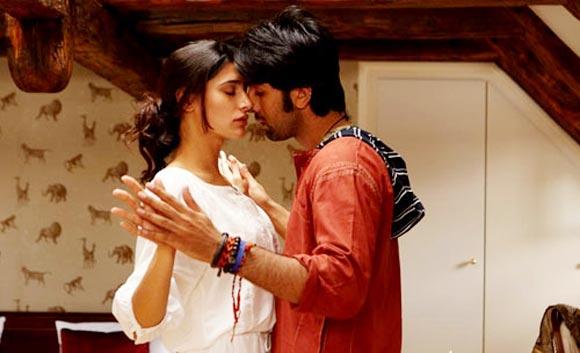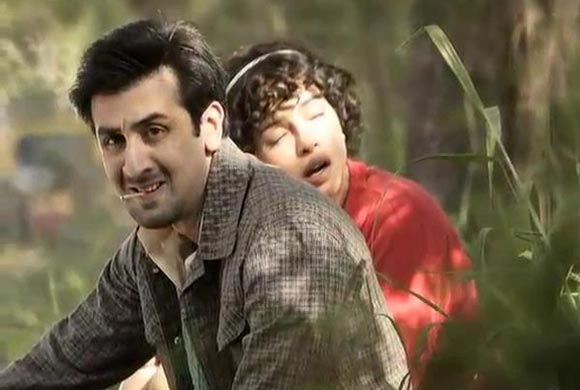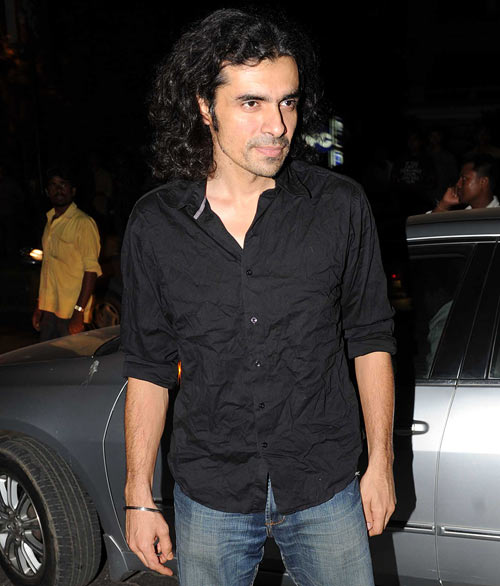
Imtiaz Ali -- who broke into television and then into films without having family connections in Bollywood, assisting a director or working for a movie production house -- will gladly tell you that he always wanted to do things in a hurry right from his childhood.
The 41-year-old filmmaker, who has three hit films in a row -- Love Aaj Kal, Jab We Met and Rockstar -- says he wanted to get married when he was 17. "I know it is illegal to do so in India but before I was 17, I had a driver's license (don't ask me how). So getting married was next on my list."
Of course, he did not get married at 17. Instead he went to college, studied English literature, and forayed into television.
But before Mumbai beckoned him and actor/TV producer Anupam Kher roped him to continue the TV series Imtihan, he had fallen in love with travel, especially train travel.
Ali recollected his life's journey so far at a New York symposium called Ticket 2 Bollywood: The Inside Story, organised by Molecule Communications in association with production company Dar Motion Pictures and actor and budding filmmaker Vikram Chatwal.
The filmmaker is planning to start his next film in about three months for producer Sajid Nadiadwala. There are reports in some publications he is working with his Rockstar team, Ranbir Kapoor and A R Rahman.
Imtiaz Ali chats with Arthur J Pais in New York.

Three hits in a row as a director and another hit with Cocktail as a writer. How has life changed?
The hit films have made life easier. I am in a stronger position to negotiate with producers and distributors.
But there are also disadvantages. I have somehow become a prized race horse, people will gladly punt on me. But I should be aware of what I am carrying.
Sometimes, I feel my success may stop people from arguing with me, questioning me and I may be surrounded by people who are either not honest with me or are afraid to be honest.
How will you protect yourself in such a case?
Luckily, the people I am close to, including my family, and the people I work with, do not have a high opinion of me. They do not have enough respect for me. (laughs)
My assistant will tell me something like, 'Why do you have to spend so much of money to build this wall, you could come to my home and shoot the scene with my wall in the background.'
I have to constantly fight to convince my associates of my vision, and before I do so, I must convince myself that my ideas and plans are better than theirs and that process keeps me on my feet, and well grounded.

Once you have completed a film and have seen it released, do you think about it?
It's not only me making a film, the film is making me too.
For instance, Rockstar is somewhat responsible for who I am. It helped me engage with myself and with the world on a deeper level, it brought me closer to my inner self.
Are there any films you wish you had directed?
I feel that with a handful of films, not because I wish the glory (of having made them) would have belonged to me or I think I could do have done a better job.
I wish I could have made these films because the experience of making them would have given me a lot of happiness and life lessons. I am aware even as I am saying this it was a tortuous process for Ramesh Sippy to make Sholay. And that is indeed one of the films I feel I should have made. Like millions of other people, I feel that the film belongs to me because I am so fond of it. And I see it in my own light.
I once told Ramesh Sippy, 'Sholay is no more your film. It belongs to me and a million others.'
Then there is Shyam Benegal's Junoon. David Lean's Lawrence of Arabia and far lesser known films like Prisoner of the Mountains (made from a Leo Tolstoy novella set in the Chechen region of Russia).

You had talked earlier about the joy of seeing films in theatres. Can you go to the theatres unnoticed today?
Of course (chuckles), but you have to be careful -- especially about how and when you enter the theatre. I recently saw Barfi! in a movie theatre. I do not like to see a film at a trial show or at a preview. I like seeing it with the audiences.
What are some of your most memorable experiences in a movie hall?
I grew up in Jamshedpur, Bihar. I had gone to see a Hindi film when I was a kid. During the intermission, a slide came up, showing the poster of an Amitabh film called Giraftaar.
A glimpse of Amitabh, and the crowd went berserk. There was such an excitement and commotion, over two dozen chairs were broken. I realised then the power of the illogical excitement of Hindi films.

Have you always worn your hair this long?
No. A few years ago, (director) Anurag Kashyap offered me a cameo in Black Friday (where he played a character called Yusuf Menon). I had to grow my hair for the role. As the film's shooting was delayed, the hair stayed and then it became a part of my look.
Is there any genre you have told yourself you will not direct?
(Chuckles) None, none, as long as I am intrigued by a story, any genre of a film would interest me. But it all begins with a story.
There are all kinds of tools available to filmmakers today. But what kind of stories do we want to tell? To me, selecting a story is an instinctive process. You need to feel compelled to tell the story you choose. So in that sense, a story chooses you.